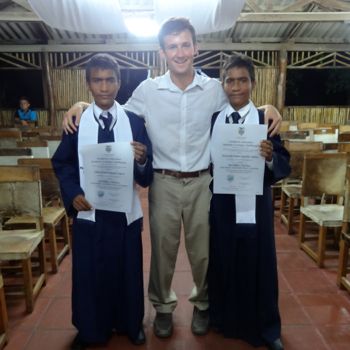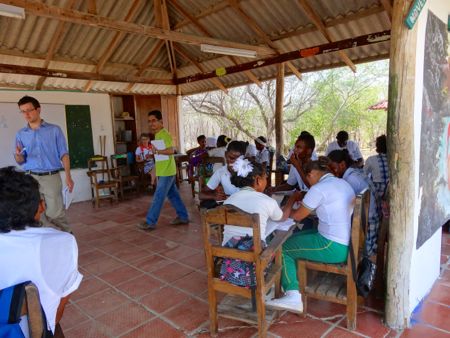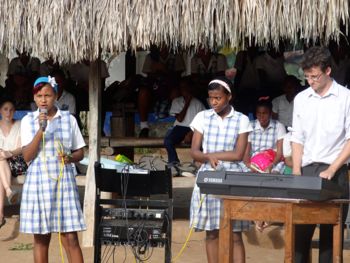Why did you decide to teach abroad with WorldTeach in Colombia?

Jon: Deciding to volunteer with WorldTeach Colombia was relatively easy, because it offered me a chance to pursue a lot of my interests as a young college graduate. I had just spent my final semester of college studying abroad in Mérida, Venezuela, and was really determined to find an opportunity to head back to South America.
I had a lot of interest in teaching but didn’t have the license to do it in the United States, so this was a logical way to teach without having to spend lots of money on licensure. And, I was really hoping to do some sort of volunteer-abroad experience before trying to find a “real job” in the states. In addition to my personal goals, a few friends-of-friends highly recommended WorldTeach programs in Ecuador and Costa Rica, so I know I could trust the organization. Finally, the few people who I knew that had traveled in Colombia had nothing but glowing reviews of it.
What made this teach abroad experience unique and special?
Jon: The placement. I’m sure that’s probably the answer the majority of people who teach abroad would give, but I did feel like I had an extremely unique teaching and living environment. I taught 9th-11th grade a K-11 grade school in a small town (about 5,000 people) on Isla Barú, a small island on Colombia’s Caribbean coast.
So how was it unique? To begin, it was just so incredibly hot all the time. Our school's classrooms were basically open-air huts, which theoretically helped with the heat but even so, one hour of teaching resulted in a sweat-drenched outfit. The heat and the frequent power-, internet- and water-outages certainly make me appreciate some of the ‘comforts’ from back home--even Minnesota winters.
I think the most unique and special part about the placement, though, was getting to know the students and members of the community. Most of Barú’s habitants are of Afro-Colombian descent and it was really interesting to experience their culture, especially their style of music and dance. It was also really amazing to see the determination of certain students to do well in school, some of whom already had family members to cook and care for at home at age 13 or 14.
What is one piece of advice you would offer someone considering teaching abroad in Colombia?

Jon: Do it. There are undoubtedly tons of options for teaching all around Latin America, and I’m in no position to say that Colombia is better than any of those because I’ve not taught elsewhere. But if you’re looking for a solid all around experience where you’ll have a chance to develop teaching and personal skills, learn about another culture and the Spanish language, and really challenge yourself, Colombia is a good match.
If you’re looking for an organized and well administrated school, that you probably won’t find unless you contract on your own with a private institute. Teaching in most schools here requires a ton of flexibility and patience for things like cancelled classes, unclear expectations and difficult student behavior. But I think most of my program-mates found teaching in Colombia improved their teaching and professional skill significantly because of those factors.
Aside from teaching, the country is host to some extraordinary travel opportunities that are mostly cheap to access through bus or plane, and the people are remarkably friendly. In most of the interior of the country, the Spanish is very clear, though the coast is another story. Of the 43 volunteers in my WorldTeach 2013 group, 20 are still in the country either teaching, pursuing further education, or coordinating volunteer groups, which speaks to how positive experience this was for most of us.
How has this experience impacted your future? (Personally, professionally, academically, etc.)

Jon: Though I only finished this experience 3 months ago, it seems safe to say it will have a great impact on my career. I had a positive enough experience that I decided to continue working with Volunteers Colombia (the organization with which WorldTeach partners) and am now teaching university students in Manizales.
Personally, I think this experience confirmed for me that teaching is a career I would enjoy, while giving me a real appreciation for just how difficult being a good teacher—especially with low-income and at-risk students—is. It also made me consider working in the ESL field or in international education, two things that weren’t on my radar before the last year.
Professionally speaking, teaching in Colombia provided me with a lot of useful skills that would’ve benefited me even if I hadn’t continued teaching. I think one of the more important things I learned was to have an internal locus of control. Many things, such as the school’s grading and discipline structures were very frustrating at first, but I learned to focus more on things I could control--how I planned my classes, what attitude I took towards the students, etc. Additionally, I learned important communication skills from having to navigate in a foreign language, school system and culture.